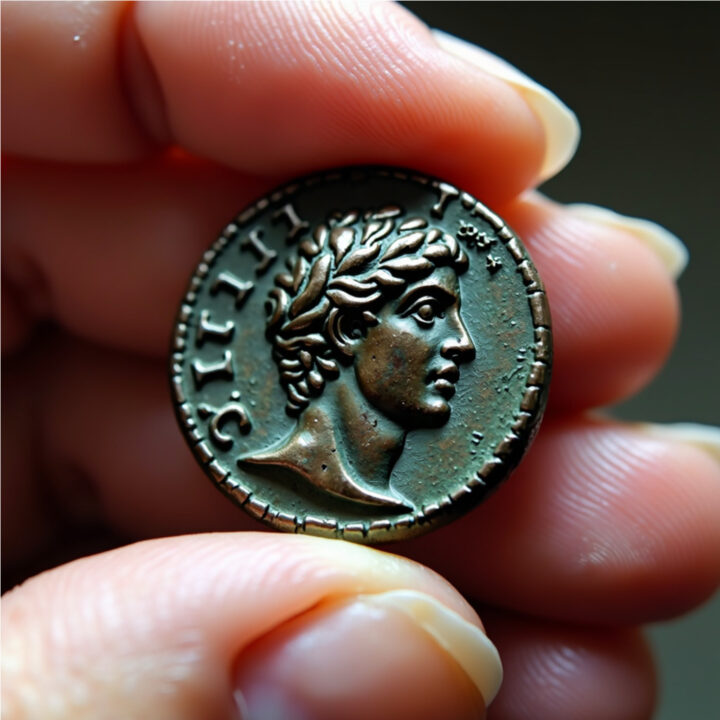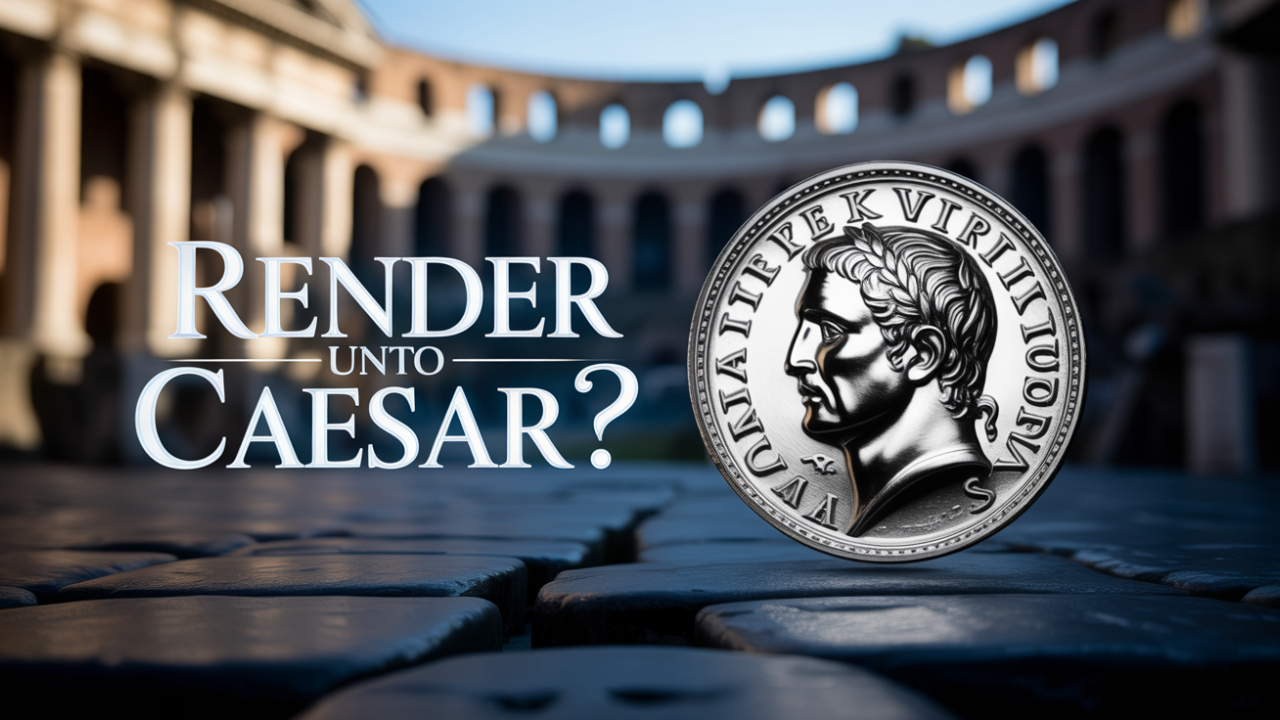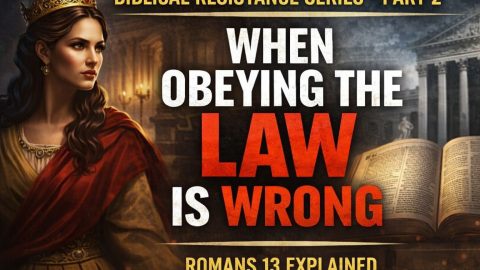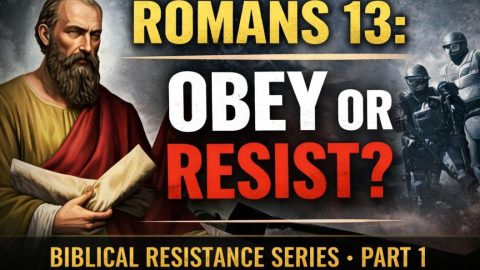Adapted from the upcoming release of “The Downfall of Tyranny”
When discussing the Christian obligation to pay taxes, it is frequently asserted, “Did not Christ instruct us to render unto Caesar that which is Caesar’s?”—implying a divine endorsement of civic taxation.
A scriptural response is that we give Caesar what belongs to him—what he’s rightfully owed. That’s all Christ is really saying. It lines up with what the Apostle writes in Romans 13:7: ‘Pay everyone what you owe them—taxes to whom taxes are due.’ Jesus isn’t going beyond that—He’s simply saying, if something justly belongs to Caesar, then give it to him.
Second, Christ doesn’t actually settle the question of whether tribute was rightfully owed to Caesar. If anything, He sidesteps it. His response is deliberately ambiguous—open to multiple interpretations. It didn’t satisfy the questioners; it just left them amazed. As we read in verse 22, they marveled, but they didn’t agree or approve—they simply walked away, realizing they couldn’t trap Him.

Now, some argue that because the coin bore Caesar’s image and inscription, Christ implied it rightfully belonged to him. But that doesn’t hold up—if that were true, then all the money in the land would belong to Caesar, since all of it bore his image. No one would own anything.
It seems more likely that Christ’s aim was to outmaneuver the trap, not to make a legal ruling on taxation. Still, His words make one thing clear: we’re not to give Caesar more than what’s truly his.
Third, we’ve got to notice something important here: Jesus doesn’t just mention Caesar—he puts God right alongside him. “Give to Caesar what’s Caesar’s, and to God what’s God’s.” But according to Proverbs 19:17, what we give to the poor is considered a loan to God. That means caring for the poor isn’t charity—it’s a moral obligation. By both divine law and natural justice, the poor have a rightful claim on our resources. They’re not supposed to be out on the streets begging or driven to steal, like so many are today.

So when we hand over money to rulers who use it to fuel greed and corruption—when we do that instead of helping those in need—we’re not just short-changing the poor. We’re robbing God of what’s his, all under the false banner of paying Caesar what he supposedly deserves.
No matter how much power Caesar and his officials may claim—the power to rob the poor, to waste what belongs to them on lust, drunkenness, wild parties, and godless excess—they still have no right to do it.
But sadly, we see it happening all the time. Just like Solomon said in Ecclesiastes 4:1: “I looked again and saw all the oppression under the sun—how the oppressed wept, but had no one to comfort them; power was on the side of their oppressors—and still, no one to comfort them.”
And Proverbs 28:15 hits just as hard: “Like a roaring lion or a charging bear is a wicked ruler over a poor people.” These aren’t just ancient words—they speak to the injustice we see in our own time, when those in power trample the people without mercy or accountability.
Of course, the shallow-minded will chime in, “Didn’t Jesus pay tribute to the Roman authorities in Matthew 17:27? And aren’t we supposed to follow in His footsteps?”—as if parroting a verse without context were the height of theological insight.

The text doesn’t actually say Christ paid tribute—it says He gave the tribute collectors a coin so they wouldn’t be offended. That’s a big difference. He wasn’t submitting to their authority—He was avoiding unnecessary conflict. Let’s not twist the Scriptures to justify submission to corrupt power.
The tax collectors came to Peter and asked, “Does your teacher pay the tribute?”—ὑ τελεῖ—which suggests they weren’t sure. They likely saw Jesus as a threat to the established political order, maybe even a rebel against the kings of this world. Peter, assuming Jesus would go along with it, answered “Yes.” But as he was heading in to talk with Jesus, Christ stopped him with a question: “Tell me, do the kings of the earth collect taxes from their own children—or from strangers?” “From strangers,” Peter replied. “Then the children are free,” Jesus said.
It’s as if He were saying, “They’re asking if I pay tribute—as if it’s something I owe. But I don’t. We’re children of the nation, not outsiders. We’re free—they have no rightful claim over us. Still, to avoid stirring up unnecessary trouble, go ahead and give them the coin.”
It wasn’t submission. It was strategy.
And of course, the self-styled scholars and armchair theologians will smugly reply, “But weren’t Christ and His apostles, as part of the Commonwealth, obligated to contribute their fair share to the public expenses?”
Yes, we’re willing to accept fair and reasonable taxes, but this one seems unjust and oppressive—like the kind of taxes kings would impose on outsiders, not on the people they ruled. Christ and Peter, as freeborn individuals and citizens, were rightfully exempt from such taxes, and so are we when it comes to these unreasonable demands that are being forced on us today. In all fairness, we aren’t obligated to pay taxes that serve only to satisfy the desires of those in power and keep us trapped in this cycle of servitude.
You might hear someone say, “But didn’t Christ pay the tax to avoid causing a scene with the collectors? Doesn’t that mean we should just hand over our money to the tax authorities to keep the peace?” It’s the kind of thinking that might sound reasonable to those who’d rather go along with the system than challenge it, but it’s really just a way of justifying submission without ever questioning the truthfulness of it all.

First off, Christ and Peter were just two individuals, and for them to stand up against the rulers’ oppression when the rest of the nation went along with it would’ve been pointless. Christ took on the role of a servant and chose to humble himself by living a lowly life in this world. He didn’t come to settle political disputes with his kingly power; he came to endure suffering. Unless he had chosen to use his divine power to defend his own and the nation’s freedom (which, at that time, was not his purpose), it would’ve been futile for him to challenge the authorities. But just because the majority of the nation accepted that unfair tax and burden, it doesn’t mean it was wrong for them to resist it, or that it’s wrong for us to do so now.
Second, Christ and Peter had a unique mission that the rest of the people didn’t. Christ was sent to bring good news to sinners, to seek and save lost souls, and to reveal a mystery that had been hidden for ages. If he had gotten into a fight with the rulers over taxes, especially when the nation was going along with it, it would’ve only served to derail the very mission he came for. The rulers would’ve been offended and would have shut down his preaching. But that doesn’t mean that the rest of the nation, who didn’t have that same specific mission, couldn’t have resisted the rulers for their rightful freedoms and rights, or that we, today, can’t stand up to our own oppressors. Just like the people did in Rehoboam’s time, we too have the right to challenge unjust burdens.
Third, Christ had a way of avoiding conflict with the authorities that we just don’t have. He performed a miracle and got the money he gave them straight from the mouth of a fish. We don’t have that option. We can’t just hand over the money they demand; we’re forced to take it from our wives, children, and the poor, who suffer because of what we give to the magistrates to fund their indulgences. If the people who are being taxed could somehow create money or receive it through a miracle without taking it from their families and the needy, maybe there would be a better case for paying these unreasonable taxes (though that still wouldn’t make it our duty). But the reality is, we can’t give them what they ask for without pushing our loved ones into poverty and leaving the poor to starve. There’s no reasonable obligation for us to give them what they demand.
One might expect to hear from someone with limited understanding, “But would you really let individuals decide for themselves if the taxes the government demands are fair and necessary for the common good? If everyone did that, how would any government survive? Some, out of ignorance, others out of greed or envy, would always be complaining and never contributing willingly, and the whole country would be ruined.”

Every free-born individual can be seen in two ways: as a private person or as a subject.
A private individual, as just one person, is separate from the rest of society, and therefore not in a position to decide for themselves what taxes or tribute they should pay to the government. Instead, they should generally submit to the judgment of the broader society, unless they are certain that it is unjust. If an individual believes the whole society is making an unjust decision, they are not obligated to go along with it. For example, if an entire nation decided to unfairly punish someone—confiscating their property or taking their life for something they didn’t do, or for following God’s commands—they wouldn’t be required to submit to such an unjust judgment. They could legally escape and preserve their life and property if possible. Similarly, in matters of taxation, if a society collectively agreed to an unjust war of aggression, built a superstitious or idolatrous temple, or held an immoral or unchristian celebration at public expense, and imposed a tax to pay for it, an individual has every right to refuse to participate. This is because such actions would go against God’s law.
But if a nation imposes a tax that isn’t in conflict with God’s law, then an individual shouldn’t act as their own judge but should submit to the judgment of society as a whole. For instance, if a society, through public consent, decides to raise taxes to fund a navy for defense at sea, an army for defense on land, build fortifications for general security, or any other legitimate need, a private person can’t decide for themselves what they should pay to the government. They must go along with the decision of the broader society, because there may be a necessity they don’t fully understand.
Even if we assume that a private person can never act as their own judge against the whole society, we must still consider the individual in their public role, as part of the larger whole. In that context, they do have a say in the matter. After all, every individual contributes to making up society, and in that sense, they are judges over the government. The government exists to serve the people, and it’s the people who determine what powers and compensation are appropriate for those they employ in public office.
A reasonable person might ask, “How can we tell the difference between a tax that’s legitimate and one that isn’t? After all, we need to be sure it’s unjust before we refuse to pay it.”
First, when the government demands taxes for unjust purposes. For example, if they use taxes to fund their own pride, greed, indulgence, luxury, or wastefulness, we’re not obligated to pay what they ask. I’m not saying we shouldn’t give it to them in some situations, especially if we have no other choice and it won’t ruin us. It’s like giving your wallet to a thief rather than risking your life. But, in good conscience, we are free to refuse if we can do so safely. When it’s clear to everyone that the government is using our money for their own selfish desires, rather than for the common good, we are not obligated to support them.

Oh, how many hundreds of millions—no, trillions—of dollars have these people drained from people in just the past few years? And where has it all gone? Into their lavish lifestyles while we remain trapped in poverty. The amount of pride and wastefulness they’re guilty of is staggering. Who can even begin to measure the greed of the clergy and lawyers? The insatiable hunger of the courtiers, who are like a bottomless pit—never satisfied, always wanting more. A generation whose greed is so fierce, it devours the poor and needy, as described in Proverbs 30:14. They’re like a whirlpool, sucking in everything in their path, and if we allow this to continue for just a few more years, they’ll consume the entire nation. A pit as deep as Hell itself. And do you really believe it’s your duty to support places like playhouses and brothels for the elite, with the money that should be used to feed your children, feed the hungry, and clothe the poor?
Second, when the powerful impose the burden on the weak, when the rich shift the weight onto the poor, the poor are not obligated to carry that burden for the rich. If a parliament made up of lords, knights, and gentlemen—who control the majority of the land’s wealth—decides to place the tax burden on poor workers and laborers who earn their living through hard work, it’s unjust, and there’s no obligation for them to comply.
Third, when the taxes are more than the people can afford to pay without ruining the land and damaging the country, when it’s not just a few greedy or envious individuals, but the majority of the nation, struggling under the weight of it all and complaining that it’s too much to bear—and the government keeps piling on even more—then the leaders are nothing but oppressors, and the people have every right to take action to fix the situation if they’re able to.
You might hear someone with a narrow view say, “But the people have entrusted Parliament with this responsibility, so whatever taxes their so-called representatives have decided on, the people are bound to pay.”
As stated above, in terms of power, we give Parliament the authority to raise taxes that are necessary for our security and to fund the services the King is supposed to provide. But we don’t give them the power to drain us dry or oppress us, to take away the bread from our wives and children just to fund a bunch of arrogant, lazy, drunken, and debauched courtiers—worthless parasites who refuse to work. And by the law of God, as stated in 2 Thessalonians 3:10, they shouldn’t be eating at all. For the people to be forced to give away their wealth—taking away from their families and from the poor—to fuel the desires of these cruel rulers who strip away all their freedoms, both as individuals and as Christians, is more than any number of parliaments have the right to impose, and it’s foolish for us to stand for it.
Dig into the principles of natural law here:
https://treeoflibertysociety.com/resources/
Learn more about the proper response to tyranny in Killing No Murder.









One Response
Caesar’s “authority” has zero legitimacy. Caesar doesn’t actually have some right to rule and force us and tax us. So what do we owe Caesar? What’s rightfully Caesar’s? Nothing.